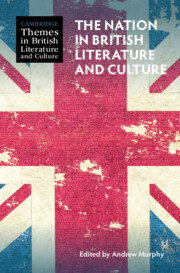Book contents
- The Nation in British Literature and Culture
- Cambridge Themes in British Literature and Culture
- The Nation in British Literature and Culture
- Copyright page
- Contents
- Contributors
- Acknowledgements
- Part I Origins
- Part II Writing the Nation
- Part III Revolutions and Empires
- Chapter 9 The American Revolution
- Chapter 10 The French Revolution
- Chapter 11 ‘And What Should They Know of England Who Only England Know?’
- Chapter 12 Rather Unpleasant Stories
- Chapter 13 Sun-Drowned Streets and Wasted Lives
- Part IV Making the Modern Nation
- Part V Futures
- Index
Chapter 12 - Rather Unpleasant Stories
Popular Fictions of Empire
from Part III - Revolutions and Empires
Published online by Cambridge University Press: 20 July 2023
- The Nation in British Literature and Culture
- Cambridge Themes in British Literature and Culture
- The Nation in British Literature and Culture
- Copyright page
- Contents
- Contributors
- Acknowledgements
- Part I Origins
- Part II Writing the Nation
- Part III Revolutions and Empires
- Chapter 9 The American Revolution
- Chapter 10 The French Revolution
- Chapter 11 ‘And What Should They Know of England Who Only England Know?’
- Chapter 12 Rather Unpleasant Stories
- Chapter 13 Sun-Drowned Streets and Wasted Lives
- Part IV Making the Modern Nation
- Part V Futures
- Index
Summary
This chapter focuses on the pairing of popular fiction and imperialism. It takes as a starting point the historical coincidence of the rise of new forms of popular fiction with the intensification of colonialism in Britain during the New Imperialism (roughly from the 1870s to 1914). Examining titles including H. Rider Haggard’s King Solomon’s Mines (1885), Richard Marsh’s The Beetle (1897), Rudyard Kipling’s Kim (1901) and numerous others, the discussion treats Victorian popular fiction as both a site where colonialist ideology exerts its power and a site where ambivalences, vagaries and paradoxes speak of a struggle to make sense of imperial rationales. Examining how popular fiction represents history and the individual, landscape and temporality, threat and assimilation and the supposed adaptability of Englishness reveals some of the rhetorical and ideological contortions that rendered British imperialism thinkable to its own prosecutors.
- Type
- Chapter
- Information
- The Nation in British Literature and Culture , pp. 207 - 224Publisher: Cambridge University PressPrint publication year: 2023

